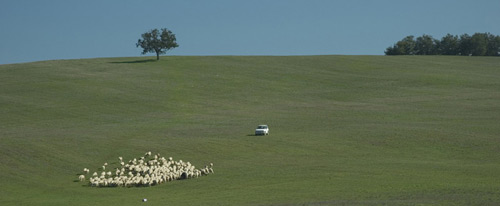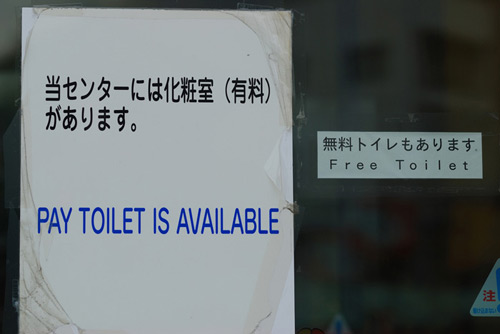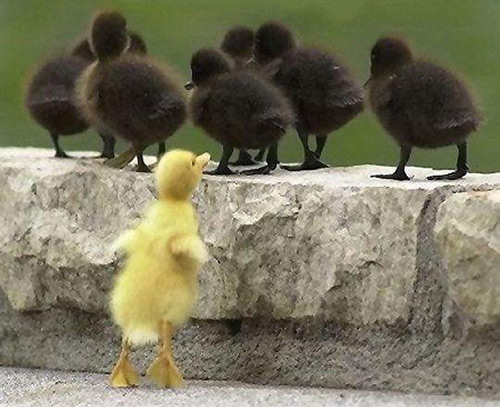As newspapers, magazines and media experience a shifting business model – with revenue becoming more scarce – perhaps it is time to look beyond the concept of “publishing.”
Instead of a publishing model, perhaps creating an economy of solutions is the way forward for newspapers and magazines.
The goal for B2B media is this:
Become an integral part of your industry’s business operations, not just a “nice to have” product.
Likely, few publishers think that their newspaper or magazine is dispensable, but as the recession continues, I hear more stories about companies canceling subscriptions, and customers finding critical information & solutions through other means.
And that’s where the distinction lies: are you a part of a core business process, or do you simply “inform” readers, hoping it leads to a benefit for their business? To explore these concepts, I want to look at the idea of creating online communities, take you through some consumer based economies, and the explore some small ways that publishers can transform their products from “information” to “solutions.”
The Value of Community
As publishing and media continue to shift – many are looking to create “online communities” to engage their industry and leverage this attention to grow revenue and the scale of their business.
Most who try to create these online communities will fail.
Often, these failures are blamed on the technology itself – the tools that enable online communities. And yet, we have all seen community born in the most unlikely of places, in the oddest ways, with the crudest tools.
Most online communities will fail, and the tools & technology are not the cause of this failure.
The failure goes deeper – it is often due to taking the wrong approach, and more likely – with the wrong goals. Many businesses try to capture the attention of their customers in their own walled-garden, with the hope that a vast network of “users” will create a community on their own. These businesses hope for “viral” growth that is easy and fast. Selfish goals like this which don’t first serve a need of customers and their industries will almost certainly lead to failure.
So I want to take a look at the underlying basis of many online communities: the idea of creating an economy. First, let’s take a look at a few easy examples.
Examples of Online Economies
Here are some well-known online economies:
- Google Ads
An economy in the terms we know it best – with money changing hands. You can get started with pennies, and know that you are reaching a very targeted audience. You are seen by potential customers at the exact moment they have a specific need, as indicated by their search query. - Apple’s iPhone App Store
Apple encouraged independent developers to create little applications that people can buy or download for free for their iPhones. It set off a tidal wave of developer interest, created a pot of gold for some of them, and since it is not especially hard to develop for, is taking developer attention away from gaming platforms like the Wii and Playstation which have a much higher barrier for entry and expense. - eBay, Craigslist, Amazon, Stubhub, etc:
Each enables individuals to become small business owners with zero setup. You can sell some extra stuff you found in your closet, or create a full business with inventory, that leverages eBay or Amazon’s distribution channel and website as your front end. Each example differs slightly, which shows how flexible this model can be. - Monster & other Job Boards
Websites like this have become an integral part of an existing process. It becomes easy to get involved from either perspective – if you are a job seeker or a business seeking en employee. - Apple’s iTunes
Apple did the impossible – taking over the record industry single handedly, and becoming a primary distribution channel for music, from independent artists, to big name labels.
There are a few common threads in these examples:
- Each service relies on a network of users and partners to create content for it.
- A new revenue stream was created that benefited their users, encouraging them to get involved.
- There is a low barrier for entry to get involved. You can easily test the waters before you jump in.
- The service provider gets a cut of any revenue provided from it.
- They offer the ability to create an identity, or better position or extend your brand.
But can each of these economies be considered communities? That’s arguable, but just to keep things interesting, lets say: no. So why am I positing this concept of an economy as the basis for creating online communities? Let’s take a look of some other kinds of online economies.
Economies Do Not Always Trade in Currency or Goods
Economies can be based on the trade of funds for products, but the basis of an economy can also be the free exchange of things. Here are some examples:
- Experience & Creation
- World of Warcraft:
WOW is an online game. It’s an interesting example – yes, there is a cost to the game, a subscription fee, and from what I understand, an economy of selling virtual goods. Yet the real goal is the experience of playing the game. The thing being traded here is “experience.”
- World of Warcraft:
- Knowledge
- Forums. My favorite is AudioAsylum
- Blogs & their commenters.
- Connection & Identity
- YouTube & Flickr
Many of us experience each of these as consumers, but there are tons of people who are creating content for these services, and not doing so in isolation. They are interacting with others, finding like-minded people, and becoming a part of something. For many, it is a form of expression. - StumbleUpon, Digg, Delicious:
Likewise, people curate a list of links they find valuable, and may end up being seen as a resource to others if they aggregate well enough. - Facebook, LinkedIn, MySpace:
The power of personal connections is incredibly powerful, and these services have moved them online.
- YouTube & Flickr
Of course, lines blur between each category. World of Warcraft also has elements of connection, not just “experience.” The point is:
Online communities are about more than just an economy of “attention.”
That is a horrible marketing term that tries to commoditize the value of a customer base (ooh, another horrible business term.) Economies are inherently about deeper things – things that have real meaning, and are the foundation of our culture far more than the concept of money.
An economy does not just trade in money or products; It trades in ideas, connections, beliefs, identity, solutions – it is about creation and sharing.
Tips for Creating an Online Community
The best laid plans can be easily derailed, especially when asking your industry and customers for massive behavior change. Here are some tips on engaging your industry in an online community – be it a blog, forum, social network, service, or something else:
- Create a Low Barrier to Entry

I know it can be tempting to want to capture 15 pieces of information about your customers when they sign up for your community. This instantly gives your sales team something they can sell, and gives you a ton of data on who you are serving. But you need to resist that urge or else you may scare off huge segments of your target audience.
When people first come to you, the benefit to them must be immediately apparent and simple to experience. Like all products: you have to make a promise, and allow customers to experience the benefits of that promise quickly.
- Create a Sense of Freedom

The possibilities for what can happen in online communities should capture people’s imagination. That, if they become involved, they will experience a powerful new connection, a solution to their problems, or that they will be seen as an expert in their area of interest. That, being involved somehow enhances their very identity.Think of ways to tap into people’s imagination by understanding their underlying needs and goals. Oftentimes, a sense of freedom is an inherent part of this – that there are few boundaries, and they will be able to create something unique. It’s like watching a child play with a toy in the “wrong” way – a way the designers never considered. Great products offer this kind of flexibility.
Many people look to online communities to create an identity for themselves. They want to be creative, feel unique, and connect with others in a positive way. Try to find ways that allows them to do this that isn’t in a cookie-cutter fashion.
The answer here may not always be obvious. I can’t remember where I read this story, but it went something like this:
When
Betty Crocker was first developing the boxed cake mix, they made it so you didn’t need to add an egg or oil. I think you just poured the mix into a bowl with water, then baked it. Their test bakers hated it. They needed to feel as though they were baking something, that they were creating, that they had control, that they were accomplishing something. So Betty Crocker redesigned it to require you to add an egg and oil. It became a huge hit. Go figure. - Enable Serendipity

I could care less about Facebook. But I care A LOT about reconnecting with people I haven’t seen since the third grade, or high school, or distant relatives. And Facebook makes this happen, doing so in a very clever way: by enabling serendipity.
They do so with features like “suggestions” of people I may know, taking small pieces of information I share about myself, and trying to bubble things up to the surface that will be meaningful to me. Amazon does this very well with products. Serendipity can be a powerful business driver.
- Turn Lurkers into Contributors

People join Facebook thinking they are just going to be a voyeur – they won’t put a photo up or give details about what high school they went to. But invariably, once a moment of serendipity happens, they see the benefit of CONTRIBUTING, not just lurking. Blogs are the same way. Once something sparks their interest, they cross that line and become a contributor.
The key here is encouraging this to happen as often as possible, and the trick is to move beyond the surface, to get to deeper needs and desires. Identify topics that incite conversation. What do these folks talk about at lunch? What problems are most vexing? These are the topics you should be hitting on again and again.
- When Creating “Online” Communities, Leverage Already-Established Offline Communities.
The web is littered with failed communities and failed economies. It’s an incredibly difficult balance to find. Remember in High School, how cliques seemed to form quickly, and no matter how hard you tried, each person was often locked into their role. Establishing a new order, a new identity was next to impossible.This is why it is important to get involved with communities as a member, and not just try to walk in the door and try to lead everyone right at the start. Identify established players, and find ways that you can contribute. Proving that your role is to give, not take, goes a long way in establishing credibility.
Likewise, leverage already established offline communities where you have spent years building credibility and connections.
- Go Beyond “Free vs Paid”

Free content and services should allow access for the broadest uses of your community. Highly specialized solutions should cost money. Create a sales funnel, and look for gaps in it. A forum can lead to sign ups for a webcast. The first brings you no revenue, but the latter just might.
In terms of identifying gaps – always work to better understand the needs and behaviors of your audience in order to understand how else you can serve them.
Creating an Economy of Solutions
Magazines, newspapers and other media outlets might want to consider creating an economy of solutions. Simply reporting on the news is no longer enough. Instead – focus intently on solving the needs of your customers.
For many businesses, this might require a rethink of relationships with customers and business partners. Perhaps you need to get closer to your customers in order to better understand their needs, and identify which problems they are desperately searching for solutions. For business partners, perhaps you need to help them evolve to reconsider how you can work together. The relationship might be strong, but the outcome might not be as profitable as it once was. Re-engaging with them in new ways can extend that relationship in and grow revenue on either side.
Expanding your product line and mission is a core step here. How can you build upon the trust and adherence to quality that you have built over the course of decades? How can you become a more active participant in business processes, sales cycle and problem-solving behaviors of your customers?
Turn One Great Idea Into Many Revenue Streams
For magazines and newspapers, there are many ways to think about creating an economy from an audience perspective. From a product perspective, you can think about extending a great idea from something like a single feature article, into a package of products and services that serve your customers’ needs. One article can be extended to include:
- A Webcast
- Workshops
- Breakfasts/Roundtables/In-Person Events
- Downloadable Content – Primers and White Papers
- Research
- Data Products
- Extend the idea to sister brands
So let’s take one scenario:
- Feature article: Let’s say you are doing a print feature on Green Design. (pick your industry here)
- Web article: Bring the article online, but rethink it to appeal to how people read online. Chunk larger sections into subtopic pages, include more photos, add links, and see if there is related content to pull in.
- Webcast: Two weeks after the article runs, have a webcast that speaks to feedback you have received, and can speak proactively to issues that your audience is struggling with. You can bring in panelists who worked on the article, and perhaps other experts who were sources for you.
- Downloadable Content: Can tips from the webcast be turned into an article, or even a PDF tip sheet that people can download? Are there related white papers from vendors or research you uncovered that you can allow your readers to download as well?
- Training Sessions & Live Events: Can you offer an in-person roundtable or training session as part of a larger industry event, or even in a big city that you might be located? How else can you leverage this hot topic to get in touch with readers, hear their feedback, better understand their biggest challenges, and work to solve them?
- Data products: Are you creating primary research for this piece? Do you have tables and tables of data that you didn’t print in the article, but could be useful to your readers? Think about how you can leverage this information. It could turn into a whole new product offering.
There are a few benefits to thinking about your content this way:
- It gives multiple revenue streams for your sales folks to sell.
- It speaks to the fact that people in your industry learn in different ways.
- It extends content and your resources – you have done the work, why not maximize its benefit?
There are many ways to think about how the publishing model can evolve, and what it means to create a true economy on the web. These are just some ideas to reframe the disussion.
As the recession continues to affect your customers and their business, you are left with a choice: will you become more valuable to them in their time of need, or less valuable.


It makes me sad to find my photos published by others without a credit and without being polite enough to ask permission. It's not hard to ask first, and it's really not hard to credit the person whose work you are showing, and making available to anyone who wants it to download. Please remove my photo from your site. I'm normally very happy for people to use my work, but I consider the way you are using it rude and frankly, creative theft. I hope if you consider things, you might see why.
Kate Mellersh – I wonder, since you don't credit it, if you know which photo I'm even referring to? The one with the heart in the bike wheel. Online doesn't mean available to all and sundry to put wherever they like. Please be a bit more respectful.
http://www.flickr.com/photos/katemellersh
Kate,
My deepest apologies. Of course, I will remove the photo. Each is linked to the original creator if you click on the image, but clearly, I need to make this reference more overt at the very least. Asking permission, as you suggest, is the process I need to institute.
Thanks for your understanding.
-Dan